Betta fish, also known as siamese or Japanese fighting fish are well known for being ferocious fighters and having a rather aggressive tendancies. Unfortunately, this has lead to them gathering a pretty bad reputation for aggressiveness and voilence towards certain tank mates.
Despite having a bad reputation, betta fish are one of the most visually stunning freshwater fish in the entire hobby, and there are many different types of betta fish that showcase unique patterns and beautiful colorations.

Due to their popularity and obvious beauty, betta fish are very popular amongst beginner hobbyists. However, if you are a beginner, you may want to look elsewhere - betta fish can be a handful if you are inexperienced at dealing with aggressive fish with complex requirements.
So, what kind of fish can live with a Betta? Despite their reputation, there are many fish species (and even shrimp) that can peacefully live with Bettas, but there are also some that can't. Something else to keep in mind is that your aquarium must be at least 20 gallons (90.2 liters) with plenty of natural cover and live plants to house both your betta fish and their compatible tank mates!
You can see the most common dimensions for a 20 gallon betta fish tank below:
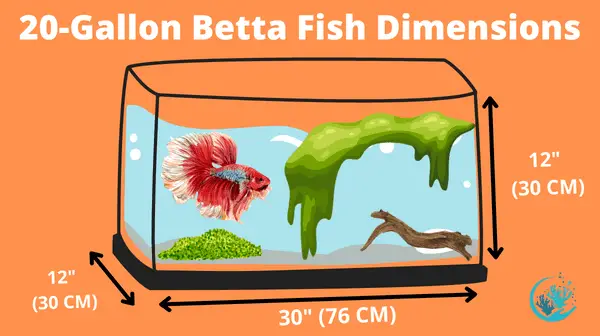
Top 5 Betta Fish Tank Mates
Now that we have discovered betta fish tank mates are a possibility and also what size tank a betta fish will need when residing with other fish - let's take a look at the top 5 best betta fish tank mates!
Before diving into our list you can check out the video I created on this topic below:
1. Ember Tetras (Hyphessobrycon amandae)
If you own Betta fish, the chances are that you enjoy bright coloration and awesome patterns on your fish. Well, these bright-orange tetras will certainly make a colorful addition to your Betta tank.
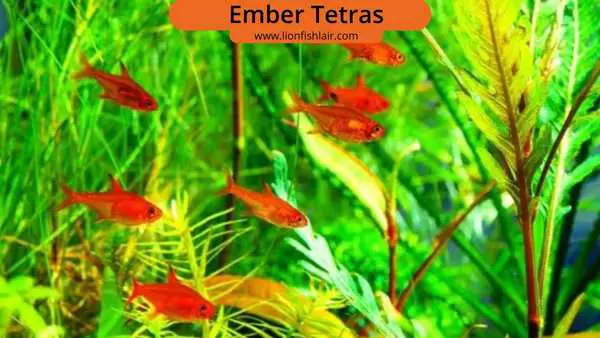
They are very small fish, growing to around 1 inch (2.5 cm) in length and they are also schooling fish, meaning that they need to be kept in groups of 5-6 to ensure they will school together, which helps avoid being singled out by an overly aggressive Betta. Ideally, they need a tank that is 10 gallons (45.5 liters) or larger in size.
Not only are these Ember Tetras peaceful and gentle by nature, but they are mesmerizingly beautiful too. They will typically swim around the middle of your tank and share the same diet as Bettas, which is brilliant for feeding your tank and is one less thing to worry about.
2. Kuhli Loach (Pangio kuhlii)
These Loaches sport a very snake-like appearance, with a body shape that resembles an eel, and a pattern that resembles a snake! However, despite looking like a snake, they are very peaceful fish and are also nocturnal. Being nocturnal makes them a good pick as they will typically huddle up in groups together during the day and then go about their business in the night time when the lights are off and your Betta fish have gone to sleep.
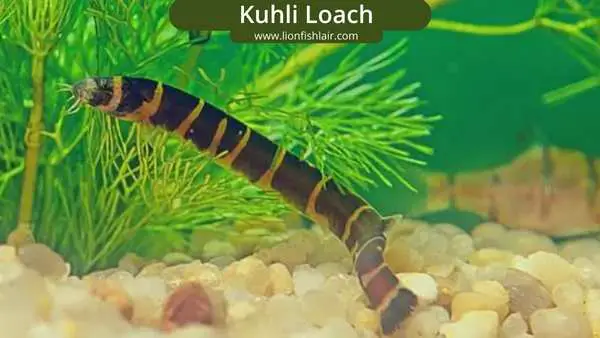
They will grow to around 3.5 inches (8.9 cm) in length and are food scavengers. This is a great attribute because they will feed off the excess food that your Bettas have perhaps missed, which will help keep your tank nice and clean too! It is, however, important to feed them their own food too, obviously. Repashy gel food, frozen bloodworms, and live blackworms are all fantastic and proven choices for the Loaches.
3. Malaysian Trumpet Snail (Melanoides tuberculata)
Similar to the Kuhli Loach, these Malaysian Trumpet Snails work very well with Bettas as they are active primarily in the night, so it would be extremely unlikely for them to bump into even the most aggressive male Betta fish.
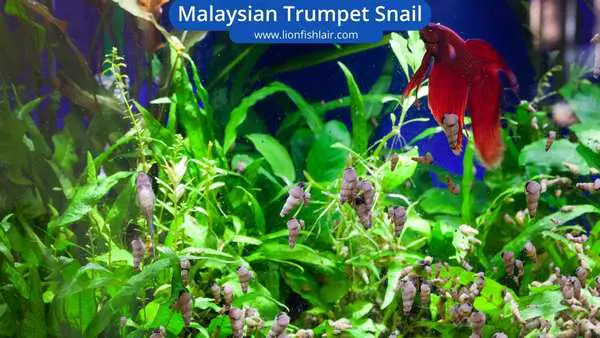
You will likely not see them at all in the daytime as they enjoy burrowing deep into the substrate. Additionally, you will not have to purchase many initially as they will reproduce quickly if you feed them well enough. They also clean algae off your glass and will eat organic debris whilst keeping waste and bioload to a minimum within your aquarium.
All in all, these snails are a brilliant addition to any Betta fish tank as they are awesome clean-up critters, but also co-exist in peaceful harmony with Betta fish. Some hobbyists consider the Malaysian Trumpet Snail as a pest because they reproduce at such a rapid rate, but if you reduce the amount of food you give to them, you slow this cycle down.
4. Harlequin Rasbora (Trigonostigma heteromorpha)
Harlequin Rasboras are gathering themselves quite the reputation for being a fantastic choice for anyone starting out in the hobby. They are only 2 inches (5 cm) in length and showcase a stunning bright orange body with a distinctive black triangular patch.
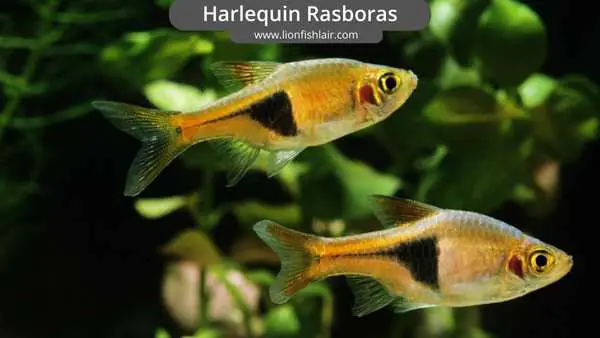
You will need to purchase a minimum of 6 rasboras as they enjoy living in schools and are extremely peaceful. Also, it helps to be in a school if a Betta fish decides to be extra aggressive. They are great feeders as they will not dominate the food when the tank is being fed and tend to stay out of the way of Bettas.
Funnily enough, Betta fish have been known to chase rasboras, but there is no need to worry as they always outrun them and it also provides much-needed exercise and stimulation for them and your Betta fish, making them ideal Betta tank mates!
5. Neon Tetra (Paracheirodon Innesi)
These little beauties are almost as popular as Betta fish themselves and for good reason! They are very small tetra fish, growing up to around 1.5 inches (4 cm), and they are also absolutely stunning. As the name suggests, they come in neon colors, silver-blue with a bright red neon stripe. Neon Tetras and Betta fish go hand in hand due to their compatible behavioral patterns and their incredible colors!
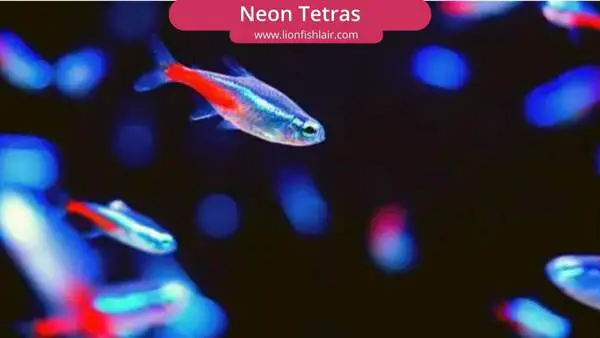
Due to their small size, Neon Tetras only need to be housed in tanks of 10 gallons (45 liters) or more and they prefer to be in schools of between 6 and 10. They tend to do very well in Betta fish tanks due to their speed and agility, avoiding any threatening situations with relative ease. Neon Tetras are a must, and you could literally spend an entire day just watching their unique behavioral patterns and beautiful colors.
Final Thoughts on Good Tank Mates for Betta Fish
Betta Fish are truly remarkable fish and are something that we believe all hobbyists should own at some point of their fish keeping journey. However, due to their aggressive nature, people are put off purchasing them as they may believe that no fish can live peacefully with Bettas.
Hopefully, this article has proven that they can live happily in the right aquarium community. Sure, they can be hard work, especially when it comes to tank mates, but we believe it is undoubtedly worth it!

